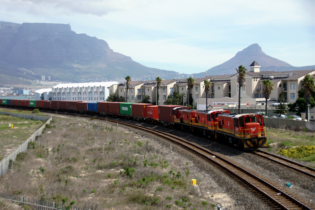A new, asset-light, proactive and customer-focused approach to transport is yielding benefifits for clients of Imperial Managed Logistics, a newly created operating company within the Imperial Logistics stable.
THE COMPANY IS ONE of the big success stories emerging from Imperial Logistics’ consolidation process, which last year saw the group’s structure simplified and its capabilities consolidated, reports chief integration officer Cobus Rossouw. Imperial Managed Logistics encompasses the long-standing reputations and experience of Broco and Cargo Africa, so it is certainly not a newcomer to the industry. What is new, Rossouw reveals, is Imperial Managed Logistics’ unique business model, which redefines customer and supplier relationships, as well as transport supply and demand The company manages logistics in an asset-light environment. “So, unlike most transport companies, Imperial Managed Logistics is not constrained by its assets. The company seeks to understand clients’ requirements, and then make transport capacity available to serve that need,”explains Rossouw. This is done through a dedicated fleet of 350 vehicles comprising both Imperial Logistics’ and suppliers’ vehicles and formal partnerships with some 1 000 sub-contractor transporters. Transport capacityUnlike traditional transport brokers, Imperial Managed Logistics has contracts in place with its transport suppliers, so that clients can be guaranteed of transport capacity, and sub-contractors can be assured of a sustainable business. “Our engagement with customers and suppliers is based on a unique model that is proving a recipe for success, and garnering praise, and business, from clients like Tiger Brands, McCain Foods and Brandhouse,” Rossouw says. Imperial Managed Logistics’ contract for primary distribution services for JSE-listed Tiger Brands will see the company transporting close to 50 000 loads per year for the FMCG group. A factor that contributed to this contract win, and one of the outstanding features of Imperial Managed Logistics’ operating model, is the visibility created for the client. Rossouw clarifies: “Historically, in transport, visibility has been fragmented. With Imperial Managed Logistics as the client’s single point of contact, end-to-end visibility of all loads, on all routes is assured.” It is provided via three 24/7 operations offices, all equipped with live satellite tracking. “This enhanced visibility enables improved decision making. It makes it possible to change the demand for transport by taking a more professional approach to understanding this demand,” he states.
Benefits
Clients also reap the benefits of Imperial’s expansive network and geographic footprint. “But,each client’s requirements are managed individually, and there is no one-sizefits- all transport solution,”stresses Rossouw.
Intermodal solutions are also offered by Imperial Managed Logistics, and the company is able to bring rail into the mix when it benefits the client, he adds. A memorandum of understanding signed with Transnet Freight Rail is enabling Imperial Logistics to build a relationship with the company, in order to leverage road and rail logistics capabilities to reduce road congestion and greenhouse gas emissions, and to lower transport costs for customers. While Imperial Managed Logistics doesn’t always own the assets, it does still take full ownership of all loads. “In terms of visibility and reporting, we take full ownership of the product, so that our clients can enjoy peace of mind and a total, end-to-end logistics solution,” Rossouw asserts. Sub-contractors’ vehicle maintenance requirements are part of their contractual agreements with Imperial Managed Logistics, and regular audits are in place to ensure vehicle and driver quality. Augmenting this is Imperial’s drive to get suppliers to pursue Road Transport Management System (RTMS) accreditation. RTMS is a nationally recognised, self-regulating scheme for heavy vehicle road transport, aimed at creating a safe, equitable and competitive heavy vehicle logistics value chain. Africa
Imperial Managed Logistics’ strategy going forward is to grow into Africa, and Rossouw anticipates an increase in opportunities with new customers and new volumes. For clients moving their goods into several African markets, the Imperial Managed Logistics’ operating model has big advantages. “Many asset-based operators and transporters operate only between South Africa and one other country, which means that clients have to deal with several different companies to reach selected cross-border destinations. Imperial Managed Logistics, however, serves as a single point of contact. It engages directly with the client to assess transport requirements and with suppliers to provide the required capacity, routes and vehicles. The best possible solution can then be designed for the client’s specific needs,” he concludes.







